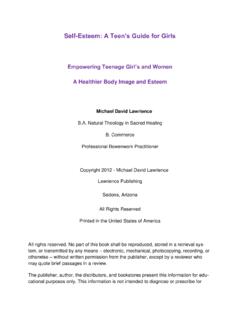Transcription of Germer, C. & Neff, K. D. (2019). Mindful Self-Compassion ...
1 Germer, C. & Neff, K. D. ( 2019 ). Mindful Self-Compassion (MSC). In I. Itvzan (Ed.) The handbook of mindfulness-based programs: Every established intervention, from medicine to education (pp. 357-367). London: Routledge. Mindful Self-Compassion (MSC) Christopher Germer & Kristin Neff Over the past three decades, mindfulness has become part of mainstream Western culture (Williams & Kabat-Zinn, 2011). compassion has always been an implicit aspect of mindfulness training insofar as we can only be truly Mindful when our awareness is warm and kind. More recently, training programs have been developed within the secular, scientific paradigm that explicitly teach compassion (Gilbert, 2009; Jazairi et al.)
2 , 2013; Pace et al., 2009; van den Brink & Koster, 2015). Mindful Self-Compassion (MSC) is one of those programs. MSC is a combination of mindfulness and compassion training a mindfulness-based Self-Compassion training program. MSC relies on mindfulness because we need to know when we re suffering in order to bring kindness to our experience and to ourselves. Self-Compassion training also tends to activate difficult emotions, at least in the initial phases of practice, so we need mindfulness to help anchor and stabilize our awareness. Finally, mindfulness training helps to cultivate spacious awareness and equanimity as a basis for compassionate action.
3 MSC is also a mix of personal development training and psychotherapy. It is primarily a resource-building program designed for the general public to enhance our capacity for Self-Compassion . MSC does not focus on healing old wounds as in psychotherapy. However, when we give ourselves kindness and understanding, we inevitably uncover events in our lives when we were not treated with kindness and understanding. MSC becomes therapeutic to the extent that we meet those old wounds in a new way with mindfulness and Self-Compassion . 2 MSC was developed by two psychologists, Chris Germer and Kristin Neff. Chris is a clinical psychologist who has been working for decades to integrate mindfulness into psychotherapy (Germer, Siegel & Fulton, 2016).
4 Kristin is a pioneering researcher in Self-Compassion (Neff, 2003a). When they met in 2008, Kristin and Chris wondered if Self-Compassion could be explicitly taught using a structured curriculum like Mindfulness-Based Stress Reduction and Mindfulness-Based Cognitive Therapy. The first MSC program took place in 2010 and a randomized controlled trial of the program was completed two years later (Neff & Germer, 2013). MSC is now being taught by hundreds of trained teachers worldwide. Both Chris and Kristin have been practising mindfulness meditation for most of their adult lives. The necessity of Self-Compassion became clear to them as they brought mindfulness to bear on their own difficulties.
5 For Kristin, it was the stress of parenting a child with autism, and for Chris, it was the challenge of public speaking anxiety. Self-Compassion adds a special element to mindfulness training. Whereas mindfulness is mostly the practice of loving awareness of moment-to-moment experience, Self-Compassion is loving awareness of the experiencer. This shift in focus is crucial when we are caught in the grip of intense and disturbing emotions. Sometimes we first need to hold ourselves before we can hold our experience in tender awareness. Theory and Research on Self-Compassion The construct of Self-Compassion is drawn from Buddhist psychology, and was first operationally defined and introduced into the psychological literature over a decade ago.
6 Neff (2003b, 2016) proposes that Self-Compassion is a type of self -to- self relating that represents a compassionate rather than uncompassionate stance toward the self when faced with personal suffering: self -kindness versus self -judgment, a sense of common humanity versus isolation, and 3 mindfulness versus over-identification. These components combine and mutually interact to create a self -compassionate frame of mind. self -kindness entails being gentle, supportive and understanding towards oneself. Rather than harshly judging oneself for personal shortcomings, the self is offered warmth and unconditional acceptance. Common humanity involves recognizing the shared human experience, understanding that all humans fail and make mistakes, that all people lead imperfect lives.
7 Rather than feeling isolated by one's imperfection - egocentrically feeling as if "I" am the only one who has failed or am suffering - one takes a broader and more connected perspective with regard to personal shortcomings and individual difficulties. Mindfulness involves being aware of one s present moment experience of suffering with clarity and balance, without running away with a dramatic storyline about negative aspects of oneself or one s life experience - a process that is termed "over-identification." The various elements of Self-Compassion are conceptually distinct and tap into different ways that individuals emotionally respond to pain and failure (with kindness or judgment), cognitively understand their predicament (as part of the human experience or as isolating), and pay attention to suffering (in a Mindful or over-identified manner).
8 Self-Compassion can be directed towards the self when suffering occurs through no fault of one s own - when the external circumstances of life are simply painful or difficult to bear. Self-Compassion is equally relevant, however, when suffering stems from one s own imprudent actions or personal failures. Self-Compassion has received considerable research attention over the past decade. The vast majority of research has been conducted with the Self-Compassion Scale (SCS; Neff, 2003a), which can be used to assess the three positive and three negative components of Self-Compassion separately, or else as an overall construct (Neff, Whittaker & Karl, 2017).
9 Increasingly, however, studies of interventions or else lab-based experimental manipulations of 4 Self-Compassion are being used to study its impact on wellbeing. Research typically shows that Self-Compassion is positively associated with psychological health (Barnard & Curry, 2011; Zessin, Dickhauser & Garbadee, 2015). In fact, one meta-analysis (MacBeth & Gumley, 2012) found a large effect size when examining the inverse relationship between Self-Compassion and depression, anxiety, and stress in 20 studies. Moreover, Self-Compassion is directly associated with psychological strengths such as happiness, optimism, and life satisfaction (Hollis-Walker & Colosimo, 2011; Neff, Rude, & Kirkpatrick, 2007), as well as being linked to increased motivation, health behaviors, positive body image, and resilient coping ( , Albertson, Neff, & Dill-Shackleford, 2014; Allen, Goldwasser & Leary, 2012; Breines & Chen, 2012; Sbarra, Smith & Mehl, 2012).
10 While Self-Compassion involves recognizing one s own needs and caring for oneself in times of suffering, this is not done in a self -centered or individualistic manner. For instance, self -compassionate individuals are more likely to forgive others, take their perspective and be altruistic than those who lack Self-Compassion (Neff & Pommier, 2013). Neff and Beretvas (2013) found that people high in Self-Compassion are described by romantic partners as more emotionally connected and supportive and less detached and controlling than those low in Self-Compassion . Paradoxical Learning A subtle challenge emerges when we add Self-Compassion to mindfulness training.










